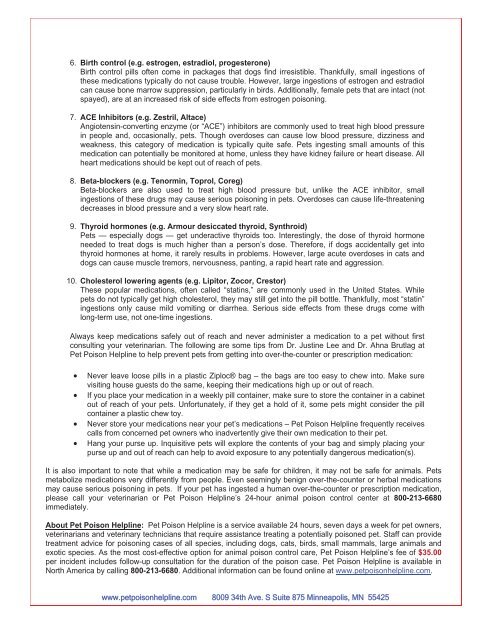Monark Puppies - Kennel Spotlight
Monark Puppies - Kennel Spotlight
Monark Puppies - Kennel Spotlight
You also want an ePaper? Increase the reach of your titles
YUMPU automatically turns print PDFs into web optimized ePapers that Google loves.
6. Birth control (e.g. estrogen, estradiol, progesterone)<br />
Birth control pills often come in packages that dogs find irresistible. Thankfully, small ingestions of<br />
these medications typically do not cause trouble. However, large ingestions of estrogen and estradiol<br />
can cause bone marrow suppression, particularly in birds. Additionally, female pets that are intact (not<br />
spayed), are at an increased risk of side effects from estrogen poisoning.<br />
7. ACE Inhibitors (e.g. Zestril, Altace)<br />
Angiotensin-converting enzyme (or “ACE”) inhibitors are commonly used to treat high blood pressure<br />
in people and, occasionally, pets. Though overdoses can cause low blood pressure, dizziness and<br />
weakness, this category of medication is typically quite safe. Pets ingesting small amounts of this<br />
medication can potentially be monitored at home, unless they have kidney failure or heart disease. All<br />
heart medications should be kept out of reach of pets.<br />
8. Beta-blockers (e.g. Tenormin, Toprol, Coreg)<br />
Beta-blockers are also used to treat high blood pressure but, unlike the ACE inhibitor, small<br />
ingestions of these drugs may cause serious poisoning in pets. Overdoses can cause life-threatening<br />
decreases in blood pressure and a very slow heart rate.<br />
9. Thyroid hormones (e.g. Armour desiccated thyroid, Synthroid)<br />
Pets — especially dogs — get underactive thyroids too. Interestingly, the dose of thyroid hormone<br />
needed to treat dogs is much higher than a person’s dose. Therefore, if dogs accidentally get into<br />
thyroid hormones at home, it rarely results in problems. However, large acute overdoses in cats and<br />
dogs can cause muscle tremors, nervousness, panting, a rapid heart rate and aggression.<br />
10. Cholesterol lowering agents (e.g. Lipitor, Zocor, Crestor)<br />
These popular medications, often called “statins,” are commonly used in the United States. While<br />
pets do not typically get high cholesterol, they may still get into the pill bottle. Thankfully, most “statin”<br />
ingestions only cause mild vomiting or diarrhea. Serious side effects from these drugs come with<br />
long-term use, not one-time ingestions.<br />
Always keep medications safely out of reach and never administer a medication to a pet without first<br />
consulting your veterinarian. The following are some tips from Dr. Justine Lee and Dr. Ahna Brutlag at<br />
Pet Poison Helpline to help prevent pets from getting into over-the-counter or prescription medication:<br />
Never leave loose pills in a plastic Ziploc® bag – the bags are too easy to chew into. Make sure<br />
visiting house guests do the same, keeping their medications high up or out of reach.<br />
If you place your medication in a weekly pill container, make sure to store the container in a cabinet<br />
out of reach of your pets. Unfortunately, if they get a hold of it, some pets might consider the pill<br />
container a plastic chew toy.<br />
Never store your medications near your pet’s medications – Pet Poison Helpline frequently receives<br />
calls from concerned pet owners who inadvertently give their own medication to their pet.<br />
Hang your purse up. Inquisitive pets will explore the contents of your bag and simply placing your<br />
purse up and out of reach can help to avoid exposure to any potentially dangerous medication(s).<br />
It is also important to note that while a medication may be safe for children, it may not be safe for animals. Pets<br />
metabolize medications very differently from people. Even seemingly benign over-the-counter or herbal medications<br />
may cause serious poisoning in pets. If your pet has ingested a human over-the-counter or prescription medication,<br />
please call your veterinarian or Pet Poison Helpline’s 24-hour animal poison control center at 800-213-6680<br />
immediately.<br />
About Pet Poison Helpline: Pet Poison Helpline is a service available 24 hours, seven days a week for pet owners,<br />
veterinarians and veterinary technicians that require assistance treating a potentially poisoned pet. Staff can provide<br />
treatment advice for poisoning cases of all species, including dogs, cats, birds, small mammals, large animals and<br />
exotic species. As the most cost-effective option for animal poison control care, Pet Poison Helpline’s fee of $35.00<br />
per incident includes follow-up consultation for the duration of the poison case. Pet Poison Helpline is available in<br />
North America by calling 800-213-6680. Additional information can be found online at www.petpoisonhelpline.com.<br />
www.petpoisonhelpline.com 8009 34th Ave. S Suite 875 Minneapolis, MN 55425









